The Entrepreneur as a Leader: Building Teams and Securing Funds Report
VerifiedAdded on 2023/05/28
|10
|3058
|75
Report
AI Summary
This report delves into the critical role of an entrepreneur as a leader within an organization. It emphasizes the importance of building and leading effective teams, highlighting key aspects such as fostering respect, delegating responsibilities, and creating a positive work environment. The report also explores the strategies for securing funding, including the necessity of thorough market research, crafting compelling proposals, and understanding financial statements to attract investors. Furthermore, it discusses the qualities of a successful entrepreneur, including the ability to make sound decisions, set a good example, and motivate the team. The document provides insights into the entrepreneur's responsibilities in developing a business idea into a successful venture. It also covers the significance of an entrepreneur's decision-making skills, setting a good example, and motivating the team to achieve their goals. The report emphasizes the importance of a strong team and a well-defined financial plan to maximize the chances of success.

Entrepreneur as a leader of an organization P a g e | 0
Topic-
Student’s Name-
Class-
Student’s Number-
Unit Code-
Professor-
Date of Submission-
Word Count-
Referencing Style-
Topic-
Student’s Name-
Class-
Student’s Number-
Unit Code-
Professor-
Date of Submission-
Word Count-
Referencing Style-
Paraphrase This Document
Need a fresh take? Get an instant paraphrase of this document with our AI Paraphraser

Entrepreneur as a leader of an organization P a g e | 1
Contents
Introduction............................................................................................................................ 2
Building a Team..................................................................................................................... 2
Enterprise and Fund Decision................................................................................................4
Conclusion............................................................................................................................. 6
References............................................................................................................................. 8
Contents
Introduction............................................................................................................................ 2
Building a Team..................................................................................................................... 2
Enterprise and Fund Decision................................................................................................4
Conclusion............................................................................................................................. 6
References............................................................................................................................. 8
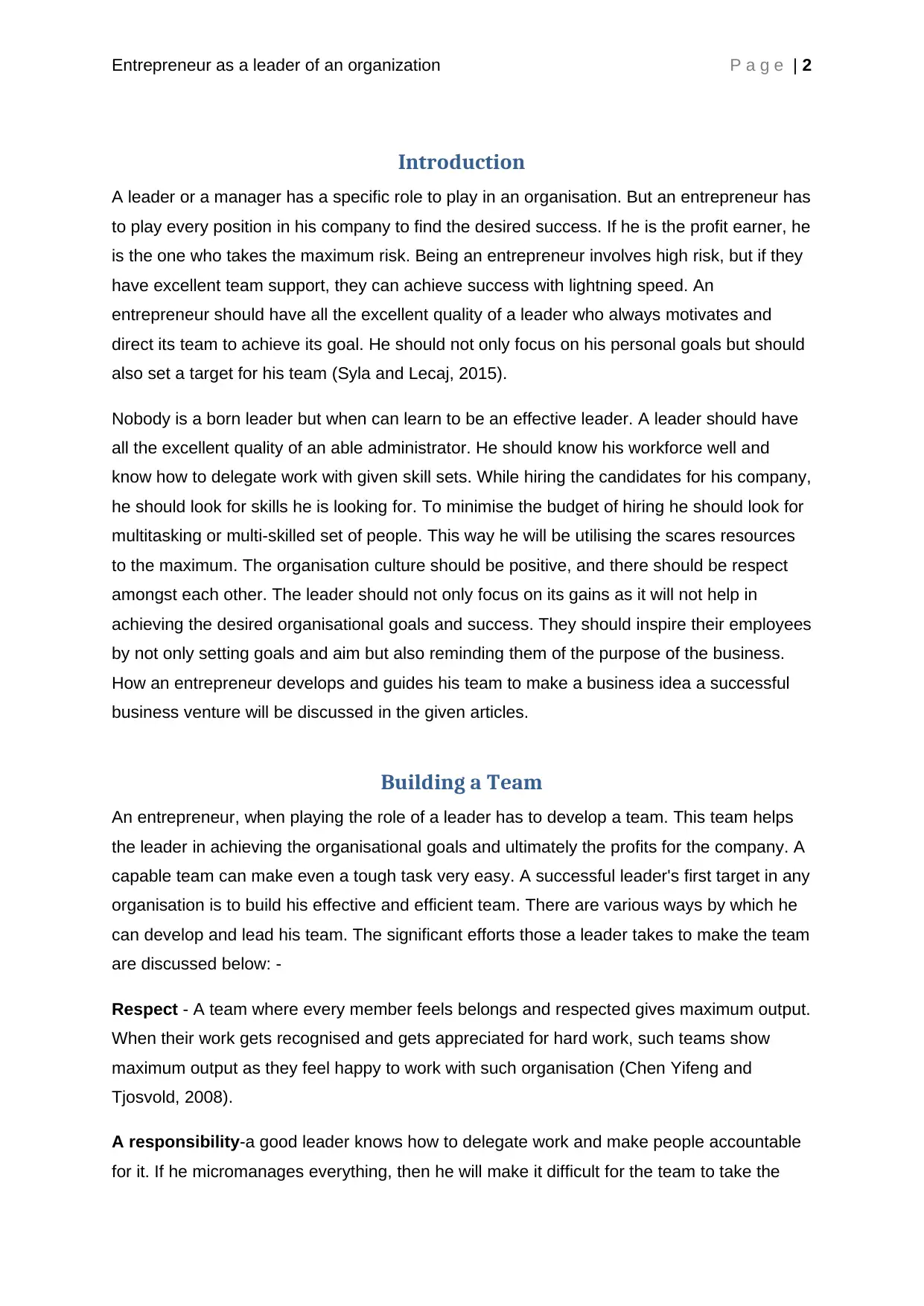
Entrepreneur as a leader of an organization P a g e | 2
Introduction
A leader or a manager has a specific role to play in an organisation. But an entrepreneur has
to play every position in his company to find the desired success. If he is the profit earner, he
is the one who takes the maximum risk. Being an entrepreneur involves high risk, but if they
have excellent team support, they can achieve success with lightning speed. An
entrepreneur should have all the excellent quality of a leader who always motivates and
direct its team to achieve its goal. He should not only focus on his personal goals but should
also set a target for his team (Syla and Lecaj, 2015).
Nobody is a born leader but when can learn to be an effective leader. A leader should have
all the excellent quality of an able administrator. He should know his workforce well and
know how to delegate work with given skill sets. While hiring the candidates for his company,
he should look for skills he is looking for. To minimise the budget of hiring he should look for
multitasking or multi-skilled set of people. This way he will be utilising the scares resources
to the maximum. The organisation culture should be positive, and there should be respect
amongst each other. The leader should not only focus on its gains as it will not help in
achieving the desired organisational goals and success. They should inspire their employees
by not only setting goals and aim but also reminding them of the purpose of the business.
How an entrepreneur develops and guides his team to make a business idea a successful
business venture will be discussed in the given articles.
Building a Team
An entrepreneur, when playing the role of a leader has to develop a team. This team helps
the leader in achieving the organisational goals and ultimately the profits for the company. A
capable team can make even a tough task very easy. A successful leader's first target in any
organisation is to build his effective and efficient team. There are various ways by which he
can develop and lead his team. The significant efforts those a leader takes to make the team
are discussed below: -
Respect - A team where every member feels belongs and respected gives maximum output.
When their work gets recognised and gets appreciated for hard work, such teams show
maximum output as they feel happy to work with such organisation (Chen Yifeng and
Tjosvold, 2008).
A responsibility-a good leader knows how to delegate work and make people accountable
for it. If he micromanages everything, then he will make it difficult for the team to take the
Introduction
A leader or a manager has a specific role to play in an organisation. But an entrepreneur has
to play every position in his company to find the desired success. If he is the profit earner, he
is the one who takes the maximum risk. Being an entrepreneur involves high risk, but if they
have excellent team support, they can achieve success with lightning speed. An
entrepreneur should have all the excellent quality of a leader who always motivates and
direct its team to achieve its goal. He should not only focus on his personal goals but should
also set a target for his team (Syla and Lecaj, 2015).
Nobody is a born leader but when can learn to be an effective leader. A leader should have
all the excellent quality of an able administrator. He should know his workforce well and
know how to delegate work with given skill sets. While hiring the candidates for his company,
he should look for skills he is looking for. To minimise the budget of hiring he should look for
multitasking or multi-skilled set of people. This way he will be utilising the scares resources
to the maximum. The organisation culture should be positive, and there should be respect
amongst each other. The leader should not only focus on its gains as it will not help in
achieving the desired organisational goals and success. They should inspire their employees
by not only setting goals and aim but also reminding them of the purpose of the business.
How an entrepreneur develops and guides his team to make a business idea a successful
business venture will be discussed in the given articles.
Building a Team
An entrepreneur, when playing the role of a leader has to develop a team. This team helps
the leader in achieving the organisational goals and ultimately the profits for the company. A
capable team can make even a tough task very easy. A successful leader's first target in any
organisation is to build his effective and efficient team. There are various ways by which he
can develop and lead his team. The significant efforts those a leader takes to make the team
are discussed below: -
Respect - A team where every member feels belongs and respected gives maximum output.
When their work gets recognised and gets appreciated for hard work, such teams show
maximum output as they feel happy to work with such organisation (Chen Yifeng and
Tjosvold, 2008).
A responsibility-a good leader knows how to delegate work and make people accountable
for it. If he micromanages everything, then he will make it difficult for the team to take the
⊘ This is a preview!⊘
Do you want full access?
Subscribe today to unlock all pages.

Trusted by 1+ million students worldwide
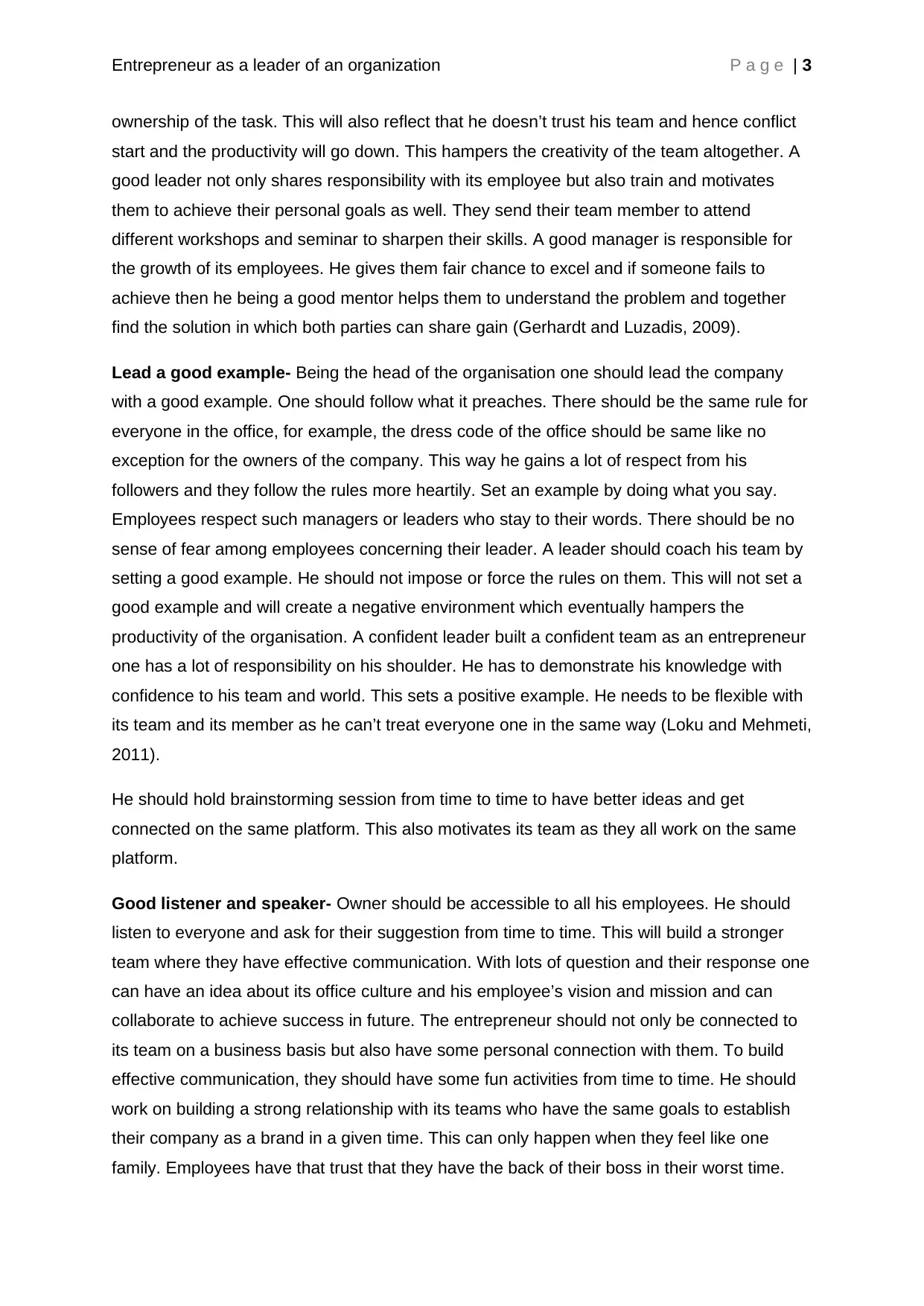
Entrepreneur as a leader of an organization P a g e | 3
ownership of the task. This will also reflect that he doesn’t trust his team and hence conflict
start and the productivity will go down. This hampers the creativity of the team altogether. A
good leader not only shares responsibility with its employee but also train and motivates
them to achieve their personal goals as well. They send their team member to attend
different workshops and seminar to sharpen their skills. A good manager is responsible for
the growth of its employees. He gives them fair chance to excel and if someone fails to
achieve then he being a good mentor helps them to understand the problem and together
find the solution in which both parties can share gain (Gerhardt and Luzadis, 2009).
Lead a good example- Being the head of the organisation one should lead the company
with a good example. One should follow what it preaches. There should be the same rule for
everyone in the office, for example, the dress code of the office should be same like no
exception for the owners of the company. This way he gains a lot of respect from his
followers and they follow the rules more heartily. Set an example by doing what you say.
Employees respect such managers or leaders who stay to their words. There should be no
sense of fear among employees concerning their leader. A leader should coach his team by
setting a good example. He should not impose or force the rules on them. This will not set a
good example and will create a negative environment which eventually hampers the
productivity of the organisation. A confident leader built a confident team as an entrepreneur
one has a lot of responsibility on his shoulder. He has to demonstrate his knowledge with
confidence to his team and world. This sets a positive example. He needs to be flexible with
its team and its member as he can’t treat everyone one in the same way (Loku and Mehmeti,
2011).
He should hold brainstorming session from time to time to have better ideas and get
connected on the same platform. This also motivates its team as they all work on the same
platform.
Good listener and speaker- Owner should be accessible to all his employees. He should
listen to everyone and ask for their suggestion from time to time. This will build a stronger
team where they have effective communication. With lots of question and their response one
can have an idea about its office culture and his employee’s vision and mission and can
collaborate to achieve success in future. The entrepreneur should not only be connected to
its team on a business basis but also have some personal connection with them. To build
effective communication, they should have some fun activities from time to time. He should
work on building a strong relationship with its teams who have the same goals to establish
their company as a brand in a given time. This can only happen when they feel like one
family. Employees have that trust that they have the back of their boss in their worst time.
ownership of the task. This will also reflect that he doesn’t trust his team and hence conflict
start and the productivity will go down. This hampers the creativity of the team altogether. A
good leader not only shares responsibility with its employee but also train and motivates
them to achieve their personal goals as well. They send their team member to attend
different workshops and seminar to sharpen their skills. A good manager is responsible for
the growth of its employees. He gives them fair chance to excel and if someone fails to
achieve then he being a good mentor helps them to understand the problem and together
find the solution in which both parties can share gain (Gerhardt and Luzadis, 2009).
Lead a good example- Being the head of the organisation one should lead the company
with a good example. One should follow what it preaches. There should be the same rule for
everyone in the office, for example, the dress code of the office should be same like no
exception for the owners of the company. This way he gains a lot of respect from his
followers and they follow the rules more heartily. Set an example by doing what you say.
Employees respect such managers or leaders who stay to their words. There should be no
sense of fear among employees concerning their leader. A leader should coach his team by
setting a good example. He should not impose or force the rules on them. This will not set a
good example and will create a negative environment which eventually hampers the
productivity of the organisation. A confident leader built a confident team as an entrepreneur
one has a lot of responsibility on his shoulder. He has to demonstrate his knowledge with
confidence to his team and world. This sets a positive example. He needs to be flexible with
its team and its member as he can’t treat everyone one in the same way (Loku and Mehmeti,
2011).
He should hold brainstorming session from time to time to have better ideas and get
connected on the same platform. This also motivates its team as they all work on the same
platform.
Good listener and speaker- Owner should be accessible to all his employees. He should
listen to everyone and ask for their suggestion from time to time. This will build a stronger
team where they have effective communication. With lots of question and their response one
can have an idea about its office culture and his employee’s vision and mission and can
collaborate to achieve success in future. The entrepreneur should not only be connected to
its team on a business basis but also have some personal connection with them. To build
effective communication, they should have some fun activities from time to time. He should
work on building a strong relationship with its teams who have the same goals to establish
their company as a brand in a given time. This can only happen when they feel like one
family. Employees have that trust that they have the back of their boss in their worst time.
Paraphrase This Document
Need a fresh take? Get an instant paraphrase of this document with our AI Paraphraser
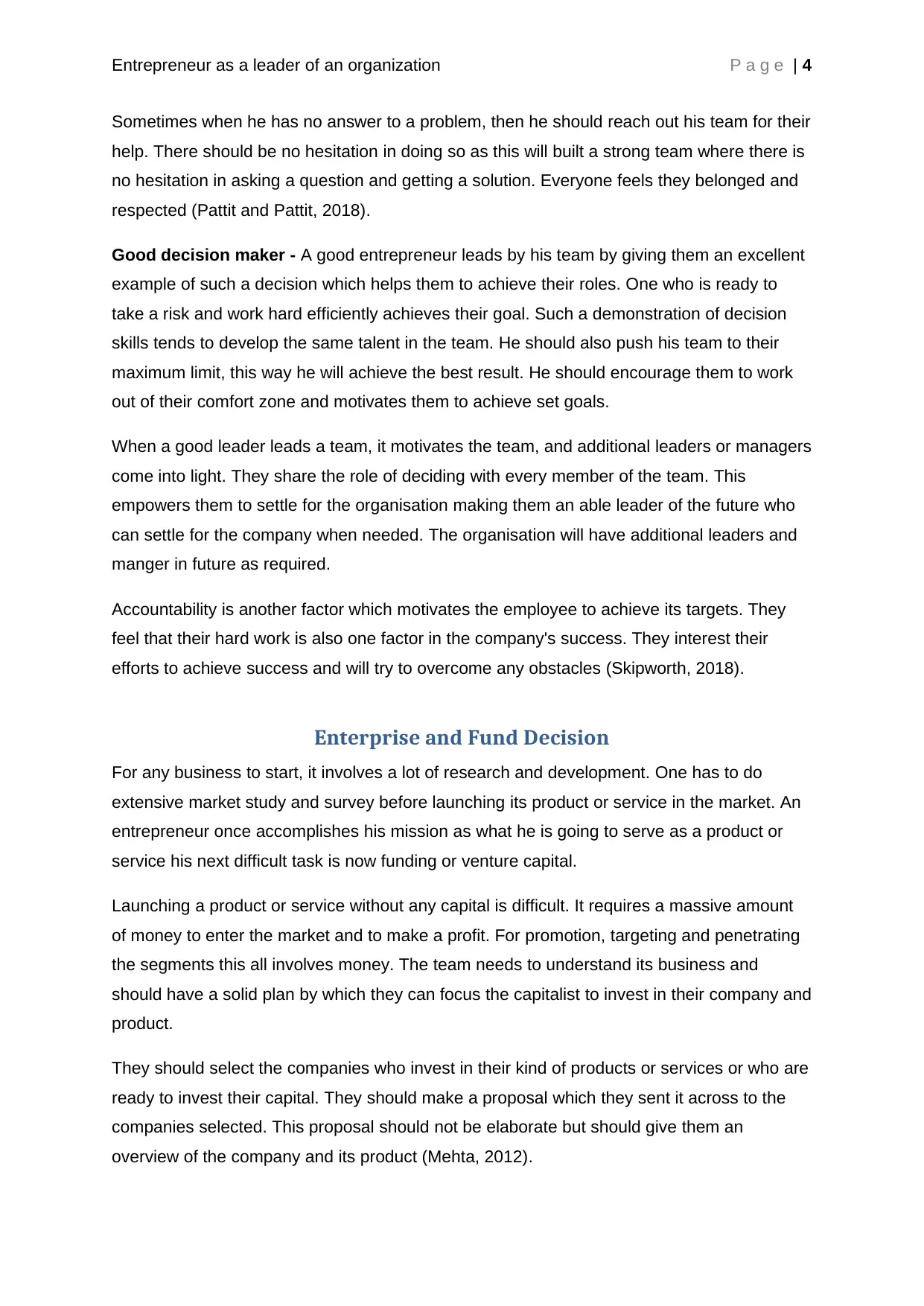
Entrepreneur as a leader of an organization P a g e | 4
Sometimes when he has no answer to a problem, then he should reach out his team for their
help. There should be no hesitation in doing so as this will built a strong team where there is
no hesitation in asking a question and getting a solution. Everyone feels they belonged and
respected (Pattit and Pattit, 2018).
Good decision maker - A good entrepreneur leads by his team by giving them an excellent
example of such a decision which helps them to achieve their roles. One who is ready to
take a risk and work hard efficiently achieves their goal. Such a demonstration of decision
skills tends to develop the same talent in the team. He should also push his team to their
maximum limit, this way he will achieve the best result. He should encourage them to work
out of their comfort zone and motivates them to achieve set goals.
When a good leader leads a team, it motivates the team, and additional leaders or managers
come into light. They share the role of deciding with every member of the team. This
empowers them to settle for the organisation making them an able leader of the future who
can settle for the company when needed. The organisation will have additional leaders and
manger in future as required.
Accountability is another factor which motivates the employee to achieve its targets. They
feel that their hard work is also one factor in the company's success. They interest their
efforts to achieve success and will try to overcome any obstacles (Skipworth, 2018).
Enterprise and Fund Decision
For any business to start, it involves a lot of research and development. One has to do
extensive market study and survey before launching its product or service in the market. An
entrepreneur once accomplishes his mission as what he is going to serve as a product or
service his next difficult task is now funding or venture capital.
Launching a product or service without any capital is difficult. It requires a massive amount
of money to enter the market and to make a profit. For promotion, targeting and penetrating
the segments this all involves money. The team needs to understand its business and
should have a solid plan by which they can focus the capitalist to invest in their company and
product.
They should select the companies who invest in their kind of products or services or who are
ready to invest their capital. They should make a proposal which they sent it across to the
companies selected. This proposal should not be elaborate but should give them an
overview of the company and its product (Mehta, 2012).
Sometimes when he has no answer to a problem, then he should reach out his team for their
help. There should be no hesitation in doing so as this will built a strong team where there is
no hesitation in asking a question and getting a solution. Everyone feels they belonged and
respected (Pattit and Pattit, 2018).
Good decision maker - A good entrepreneur leads by his team by giving them an excellent
example of such a decision which helps them to achieve their roles. One who is ready to
take a risk and work hard efficiently achieves their goal. Such a demonstration of decision
skills tends to develop the same talent in the team. He should also push his team to their
maximum limit, this way he will achieve the best result. He should encourage them to work
out of their comfort zone and motivates them to achieve set goals.
When a good leader leads a team, it motivates the team, and additional leaders or managers
come into light. They share the role of deciding with every member of the team. This
empowers them to settle for the organisation making them an able leader of the future who
can settle for the company when needed. The organisation will have additional leaders and
manger in future as required.
Accountability is another factor which motivates the employee to achieve its targets. They
feel that their hard work is also one factor in the company's success. They interest their
efforts to achieve success and will try to overcome any obstacles (Skipworth, 2018).
Enterprise and Fund Decision
For any business to start, it involves a lot of research and development. One has to do
extensive market study and survey before launching its product or service in the market. An
entrepreneur once accomplishes his mission as what he is going to serve as a product or
service his next difficult task is now funding or venture capital.
Launching a product or service without any capital is difficult. It requires a massive amount
of money to enter the market and to make a profit. For promotion, targeting and penetrating
the segments this all involves money. The team needs to understand its business and
should have a solid plan by which they can focus the capitalist to invest in their company and
product.
They should select the companies who invest in their kind of products or services or who are
ready to invest their capital. They should make a proposal which they sent it across to the
companies selected. This proposal should not be elaborate but should give them an
overview of the company and its product (Mehta, 2012).
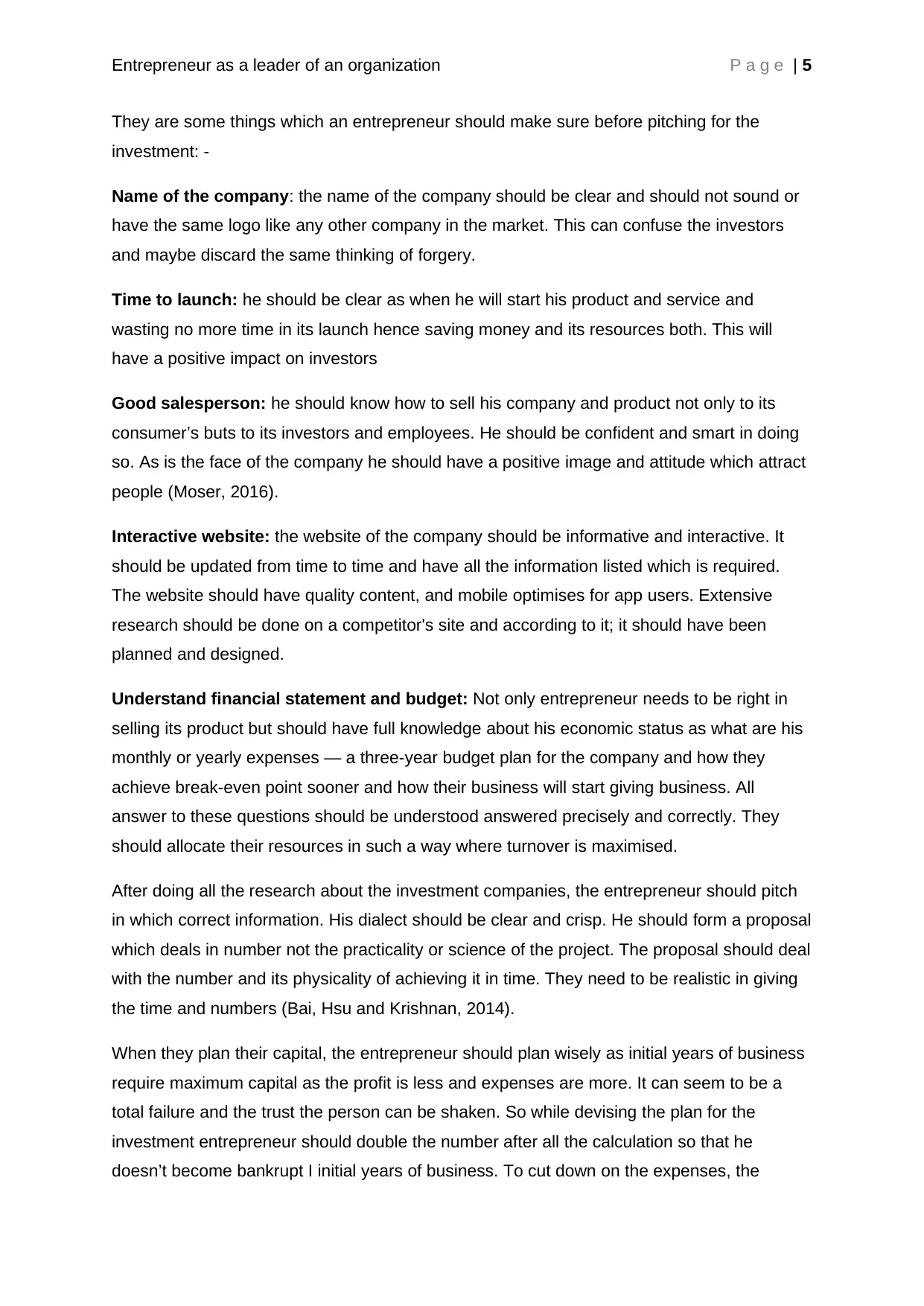
Entrepreneur as a leader of an organization P a g e | 5
They are some things which an entrepreneur should make sure before pitching for the
investment: -
Name of the company: the name of the company should be clear and should not sound or
have the same logo like any other company in the market. This can confuse the investors
and maybe discard the same thinking of forgery.
Time to launch: he should be clear as when he will start his product and service and
wasting no more time in its launch hence saving money and its resources both. This will
have a positive impact on investors
Good salesperson: he should know how to sell his company and product not only to its
consumer’s buts to its investors and employees. He should be confident and smart in doing
so. As is the face of the company he should have a positive image and attitude which attract
people (Moser, 2016).
Interactive website: the website of the company should be informative and interactive. It
should be updated from time to time and have all the information listed which is required.
The website should have quality content, and mobile optimises for app users. Extensive
research should be done on a competitor's site and according to it; it should have been
planned and designed.
Understand financial statement and budget: Not only entrepreneur needs to be right in
selling its product but should have full knowledge about his economic status as what are his
monthly or yearly expenses — a three-year budget plan for the company and how they
achieve break-even point sooner and how their business will start giving business. All
answer to these questions should be understood answered precisely and correctly. They
should allocate their resources in such a way where turnover is maximised.
After doing all the research about the investment companies, the entrepreneur should pitch
in which correct information. His dialect should be clear and crisp. He should form a proposal
which deals in number not the practicality or science of the project. The proposal should deal
with the number and its physicality of achieving it in time. They need to be realistic in giving
the time and numbers (Bai, Hsu and Krishnan, 2014).
When they plan their capital, the entrepreneur should plan wisely as initial years of business
require maximum capital as the profit is less and expenses are more. It can seem to be a
total failure and the trust the person can be shaken. So while devising the plan for the
investment entrepreneur should double the number after all the calculation so that he
doesn’t become bankrupt I initial years of business. To cut down on the expenses, the
They are some things which an entrepreneur should make sure before pitching for the
investment: -
Name of the company: the name of the company should be clear and should not sound or
have the same logo like any other company in the market. This can confuse the investors
and maybe discard the same thinking of forgery.
Time to launch: he should be clear as when he will start his product and service and
wasting no more time in its launch hence saving money and its resources both. This will
have a positive impact on investors
Good salesperson: he should know how to sell his company and product not only to its
consumer’s buts to its investors and employees. He should be confident and smart in doing
so. As is the face of the company he should have a positive image and attitude which attract
people (Moser, 2016).
Interactive website: the website of the company should be informative and interactive. It
should be updated from time to time and have all the information listed which is required.
The website should have quality content, and mobile optimises for app users. Extensive
research should be done on a competitor's site and according to it; it should have been
planned and designed.
Understand financial statement and budget: Not only entrepreneur needs to be right in
selling its product but should have full knowledge about his economic status as what are his
monthly or yearly expenses — a three-year budget plan for the company and how they
achieve break-even point sooner and how their business will start giving business. All
answer to these questions should be understood answered precisely and correctly. They
should allocate their resources in such a way where turnover is maximised.
After doing all the research about the investment companies, the entrepreneur should pitch
in which correct information. His dialect should be clear and crisp. He should form a proposal
which deals in number not the practicality or science of the project. The proposal should deal
with the number and its physicality of achieving it in time. They need to be realistic in giving
the time and numbers (Bai, Hsu and Krishnan, 2014).
When they plan their capital, the entrepreneur should plan wisely as initial years of business
require maximum capital as the profit is less and expenses are more. It can seem to be a
total failure and the trust the person can be shaken. So while devising the plan for the
investment entrepreneur should double the number after all the calculation so that he
doesn’t become bankrupt I initial years of business. To cut down on the expenses, the
⊘ This is a preview!⊘
Do you want full access?
Subscribe today to unlock all pages.

Trusted by 1+ million students worldwide
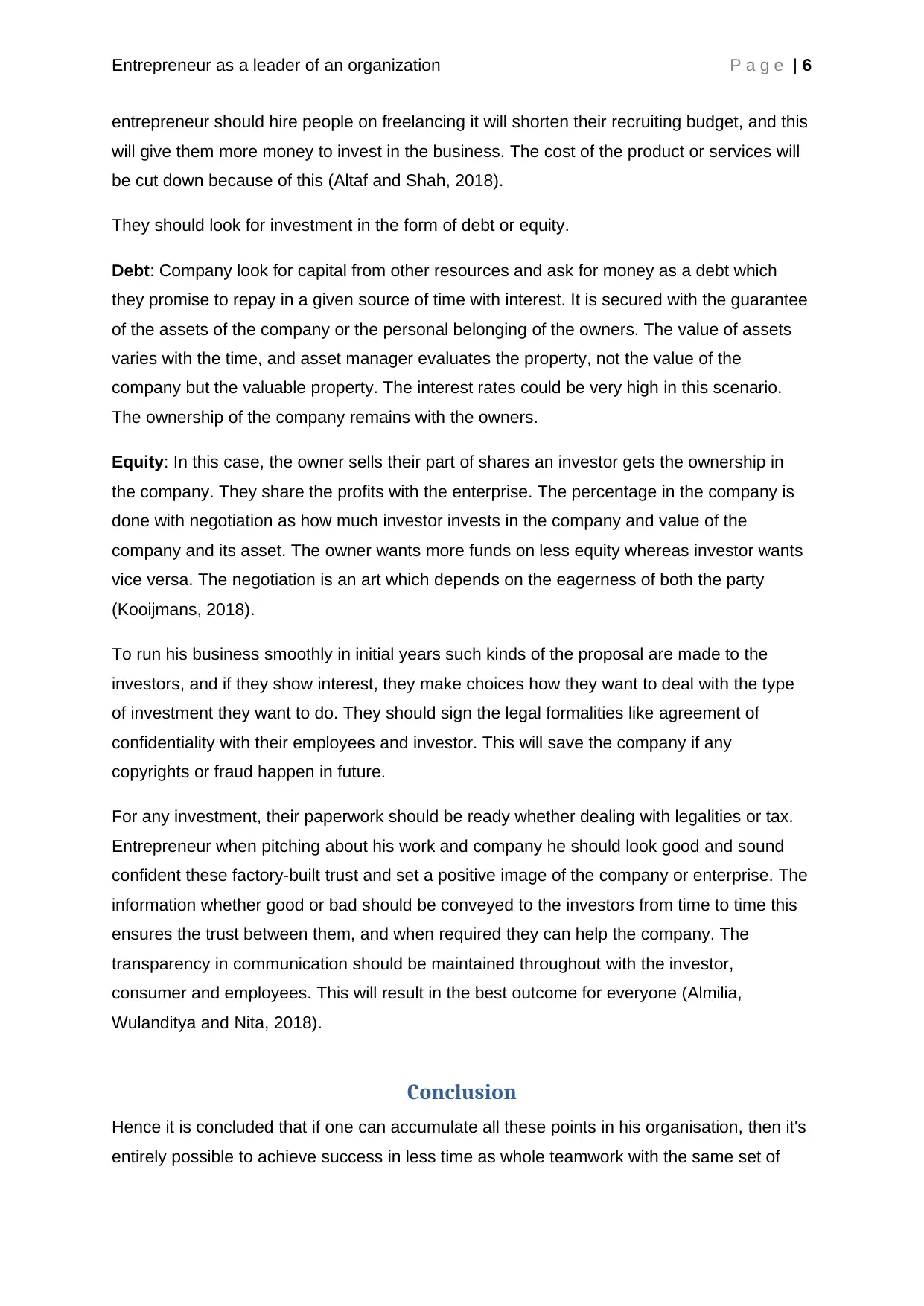
Entrepreneur as a leader of an organization P a g e | 6
entrepreneur should hire people on freelancing it will shorten their recruiting budget, and this
will give them more money to invest in the business. The cost of the product or services will
be cut down because of this (Altaf and Shah, 2018).
They should look for investment in the form of debt or equity.
Debt: Company look for capital from other resources and ask for money as a debt which
they promise to repay in a given source of time with interest. It is secured with the guarantee
of the assets of the company or the personal belonging of the owners. The value of assets
varies with the time, and asset manager evaluates the property, not the value of the
company but the valuable property. The interest rates could be very high in this scenario.
The ownership of the company remains with the owners.
Equity: In this case, the owner sells their part of shares an investor gets the ownership in
the company. They share the profits with the enterprise. The percentage in the company is
done with negotiation as how much investor invests in the company and value of the
company and its asset. The owner wants more funds on less equity whereas investor wants
vice versa. The negotiation is an art which depends on the eagerness of both the party
(Kooijmans, 2018).
To run his business smoothly in initial years such kinds of the proposal are made to the
investors, and if they show interest, they make choices how they want to deal with the type
of investment they want to do. They should sign the legal formalities like agreement of
confidentiality with their employees and investor. This will save the company if any
copyrights or fraud happen in future.
For any investment, their paperwork should be ready whether dealing with legalities or tax.
Entrepreneur when pitching about his work and company he should look good and sound
confident these factory-built trust and set a positive image of the company or enterprise. The
information whether good or bad should be conveyed to the investors from time to time this
ensures the trust between them, and when required they can help the company. The
transparency in communication should be maintained throughout with the investor,
consumer and employees. This will result in the best outcome for everyone (Almilia,
Wulanditya and Nita, 2018).
Conclusion
Hence it is concluded that if one can accumulate all these points in his organisation, then it's
entirely possible to achieve success in less time as whole teamwork with the same set of
entrepreneur should hire people on freelancing it will shorten their recruiting budget, and this
will give them more money to invest in the business. The cost of the product or services will
be cut down because of this (Altaf and Shah, 2018).
They should look for investment in the form of debt or equity.
Debt: Company look for capital from other resources and ask for money as a debt which
they promise to repay in a given source of time with interest. It is secured with the guarantee
of the assets of the company or the personal belonging of the owners. The value of assets
varies with the time, and asset manager evaluates the property, not the value of the
company but the valuable property. The interest rates could be very high in this scenario.
The ownership of the company remains with the owners.
Equity: In this case, the owner sells their part of shares an investor gets the ownership in
the company. They share the profits with the enterprise. The percentage in the company is
done with negotiation as how much investor invests in the company and value of the
company and its asset. The owner wants more funds on less equity whereas investor wants
vice versa. The negotiation is an art which depends on the eagerness of both the party
(Kooijmans, 2018).
To run his business smoothly in initial years such kinds of the proposal are made to the
investors, and if they show interest, they make choices how they want to deal with the type
of investment they want to do. They should sign the legal formalities like agreement of
confidentiality with their employees and investor. This will save the company if any
copyrights or fraud happen in future.
For any investment, their paperwork should be ready whether dealing with legalities or tax.
Entrepreneur when pitching about his work and company he should look good and sound
confident these factory-built trust and set a positive image of the company or enterprise. The
information whether good or bad should be conveyed to the investors from time to time this
ensures the trust between them, and when required they can help the company. The
transparency in communication should be maintained throughout with the investor,
consumer and employees. This will result in the best outcome for everyone (Almilia,
Wulanditya and Nita, 2018).
Conclusion
Hence it is concluded that if one can accumulate all these points in his organisation, then it's
entirely possible to achieve success in less time as whole teamwork with the same set of
Paraphrase This Document
Need a fresh take? Get an instant paraphrase of this document with our AI Paraphraser

Entrepreneur as a leader of an organization P a g e | 7
goals and aim. They have harmony and understanding to work to meet their goals. Both the
entrepreneur and his team are accountable to build their brand so their motto and aim
should be aligned and have a positive culture.
goals and aim. They have harmony and understanding to work to meet their goals. Both the
entrepreneur and his team are accountable to build their brand so their motto and aim
should be aligned and have a positive culture.
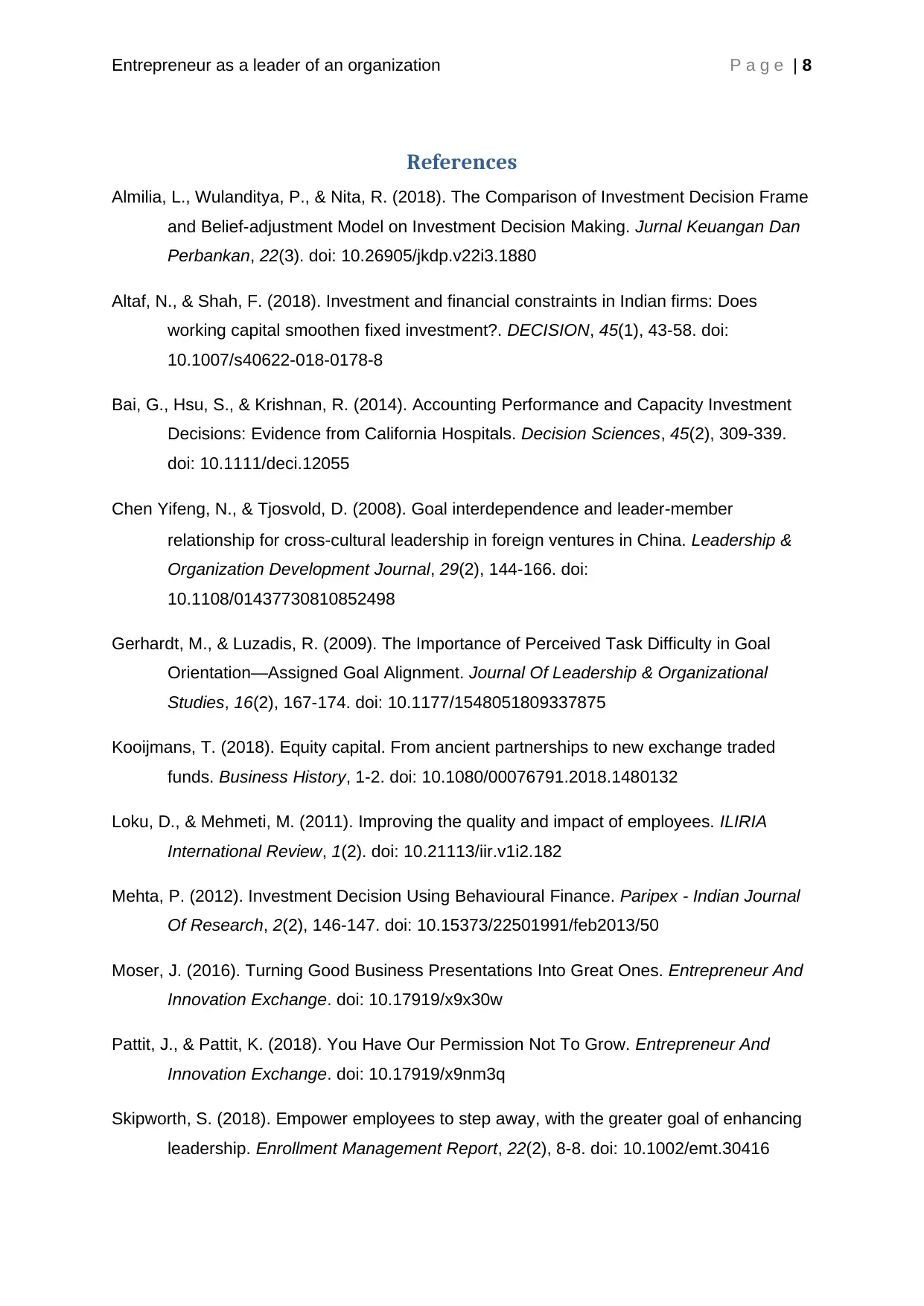
Entrepreneur as a leader of an organization P a g e | 8
References
Almilia, L., Wulanditya, P., & Nita, R. (2018). The Comparison of Investment Decision Frame
and Belief-adjustment Model on Investment Decision Making. Jurnal Keuangan Dan
Perbankan, 22(3). doi: 10.26905/jkdp.v22i3.1880
Altaf, N., & Shah, F. (2018). Investment and financial constraints in Indian firms: Does
working capital smoothen fixed investment?. DECISION, 45(1), 43-58. doi:
10.1007/s40622-018-0178-8
Bai, G., Hsu, S., & Krishnan, R. (2014). Accounting Performance and Capacity Investment
Decisions: Evidence from California Hospitals. Decision Sciences, 45(2), 309-339.
doi: 10.1111/deci.12055
Chen Yifeng, N., & Tjosvold, D. (2008). Goal interdependence and leader‐member
relationship for cross‐cultural leadership in foreign ventures in China. Leadership &
Organization Development Journal, 29(2), 144-166. doi:
10.1108/01437730810852498
Gerhardt, M., & Luzadis, R. (2009). The Importance of Perceived Task Difficulty in Goal
Orientation—Assigned Goal Alignment. Journal Of Leadership & Organizational
Studies, 16(2), 167-174. doi: 10.1177/1548051809337875
Kooijmans, T. (2018). Equity capital. From ancient partnerships to new exchange traded
funds. Business History, 1-2. doi: 10.1080/00076791.2018.1480132
Loku, D., & Mehmeti, M. (2011). Improving the quality and impact of employees. ILIRIA
International Review, 1(2). doi: 10.21113/iir.v1i2.182
Mehta, P. (2012). Investment Decision Using Behavioural Finance. Paripex - Indian Journal
Of Research, 2(2), 146-147. doi: 10.15373/22501991/feb2013/50
Moser, J. (2016). Turning Good Business Presentations Into Great Ones. Entrepreneur And
Innovation Exchange. doi: 10.17919/x9x30w
Pattit, J., & Pattit, K. (2018). You Have Our Permission Not To Grow. Entrepreneur And
Innovation Exchange. doi: 10.17919/x9nm3q
Skipworth, S. (2018). Empower employees to step away, with the greater goal of enhancing
leadership. Enrollment Management Report, 22(2), 8-8. doi: 10.1002/emt.30416
References
Almilia, L., Wulanditya, P., & Nita, R. (2018). The Comparison of Investment Decision Frame
and Belief-adjustment Model on Investment Decision Making. Jurnal Keuangan Dan
Perbankan, 22(3). doi: 10.26905/jkdp.v22i3.1880
Altaf, N., & Shah, F. (2018). Investment and financial constraints in Indian firms: Does
working capital smoothen fixed investment?. DECISION, 45(1), 43-58. doi:
10.1007/s40622-018-0178-8
Bai, G., Hsu, S., & Krishnan, R. (2014). Accounting Performance and Capacity Investment
Decisions: Evidence from California Hospitals. Decision Sciences, 45(2), 309-339.
doi: 10.1111/deci.12055
Chen Yifeng, N., & Tjosvold, D. (2008). Goal interdependence and leader‐member
relationship for cross‐cultural leadership in foreign ventures in China. Leadership &
Organization Development Journal, 29(2), 144-166. doi:
10.1108/01437730810852498
Gerhardt, M., & Luzadis, R. (2009). The Importance of Perceived Task Difficulty in Goal
Orientation—Assigned Goal Alignment. Journal Of Leadership & Organizational
Studies, 16(2), 167-174. doi: 10.1177/1548051809337875
Kooijmans, T. (2018). Equity capital. From ancient partnerships to new exchange traded
funds. Business History, 1-2. doi: 10.1080/00076791.2018.1480132
Loku, D., & Mehmeti, M. (2011). Improving the quality and impact of employees. ILIRIA
International Review, 1(2). doi: 10.21113/iir.v1i2.182
Mehta, P. (2012). Investment Decision Using Behavioural Finance. Paripex - Indian Journal
Of Research, 2(2), 146-147. doi: 10.15373/22501991/feb2013/50
Moser, J. (2016). Turning Good Business Presentations Into Great Ones. Entrepreneur And
Innovation Exchange. doi: 10.17919/x9x30w
Pattit, J., & Pattit, K. (2018). You Have Our Permission Not To Grow. Entrepreneur And
Innovation Exchange. doi: 10.17919/x9nm3q
Skipworth, S. (2018). Empower employees to step away, with the greater goal of enhancing
leadership. Enrollment Management Report, 22(2), 8-8. doi: 10.1002/emt.30416
⊘ This is a preview!⊘
Do you want full access?
Subscribe today to unlock all pages.

Trusted by 1+ million students worldwide

Entrepreneur as a leader of an organization P a g e | 9
Syla, B., & Lecaj, V. (2015). Female Enterpreneur of Small Businesses Challenges in
Kosovo. Academic Journal Of Interdisciplinary Studies. doi:
10.5901/ajis.2015.v4n2p56.
Syla, B., & Lecaj, V. (2015). Female Enterpreneur of Small Businesses Challenges in
Kosovo. Academic Journal Of Interdisciplinary Studies. doi:
10.5901/ajis.2015.v4n2p56.
1 out of 10
Related Documents
Your All-in-One AI-Powered Toolkit for Academic Success.
+13062052269
info@desklib.com
Available 24*7 on WhatsApp / Email
![[object Object]](/_next/static/media/star-bottom.7253800d.svg)
Unlock your academic potential
Copyright © 2020–2025 A2Z Services. All Rights Reserved. Developed and managed by ZUCOL.




